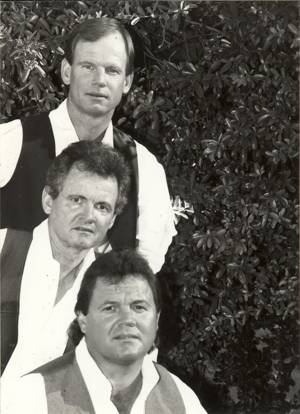By Dan Starr June 1989 – Entertainment Magazine. Page 23
 I
waited 18 years to see The Lewallen Brothers. At first, I was too young
to get into the clubs during their reign as Tucson’s most famous band
back there in the late ‘60s.
I
waited 18 years to see The Lewallen Brothers. At first, I was too young
to get into the clubs during their reign as Tucson’s most famous band
back there in the late ‘60s.
Then,
when the drinking age was lowered, I found myself too wrapped up in
college when one of the brothers had died and the group was disbanded.
For new
Tucsonans, let me fill you in. The Lewallen Brothers actually are all
brothers, with the exception of father, Cal Lewallen, founder and
bassist. They are all Tucson natives. Their band played all over the
city from the late 1950s to 1980, quite a feat for any band!
They were
in their heyday in the late 1960s and moved into “the big time” with
national tours and major dates playing with Paul Revere & The
Raiders, The Turtles,
The Yardbirds, The Lovin’ Spoonful, and Chuck Berry himself.
In 1968,
they placed second in a nationwide “Battle of the Bands” produced by
Dick Clark, and then appeared in Dick’s Television Special “Happenin’
‘68.” They also recorded on the same label as Ritchie Valens and The
Bobby Fuller Four. After the death of their brother in 1981, the family
stepped away from the spotlight. Their name faded in the memories of
old-timers like me, and it’s a safe bet that the majority of live music
fans in this transient city have never heard of them.
The
Lewallen Brothers are back, this time as a trio, and considering the
wave of interest in ‘50s and ‘60s music now sweeping the Old Pueblo,
they’re probably headed right back to the top. The group is father Cal
on bass guitar, brother Tim on drums and brother Keith on lead guitar.
The
Lewallen Brothers appearance is an attempt to cash in on the success of
the ‘50s and ‘60s music craze. But, the Lewallen Brothers are not a
nostalgia band. They are the real-thing. They are playing music they
learned when it first appeared on the Top 40. They lived the era, not
re-lived it. This gives them a grip on how that music is delivered that
is simply impossible to obtain in any other way. They played the tunes
on the equipment those tunes were written for, sang the lyrics with
three part harmony that is a trademark of that age of music.